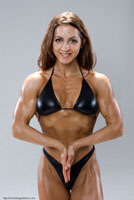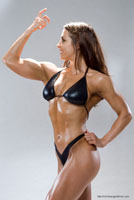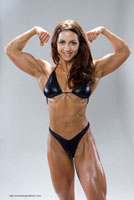 |
|||||||||||||||||||||||||||
| | |
|
| |
| | |
||||||||||||||||||||
| |
|||||||||||||||||||||||||||
| |
|
||||||||||||||||||||||||||
|
Breaking Through a Plateau by Jean Jitomir
Plateaus are a seemingly inevitable part of any contest or general weight loss diet. They are frustrating and can rob a competitor of motivation and morale. Blast through it with the suggestions below! There are several factors that can influence your fat loss 1) Diet; 2) REE/BMR/RMR, e.g. the number of calories you burn at rest 3) Cardio and weight training; 4) Lifestyle habits; 5) Fat burners/thermogenics and probably several others. You can manipulate all of these to shed body fat! Diet: Calorie Level In order to loose weight the energy you consume must be less than your expenditure, plain and simple. Food Calories are one way scientists attempt to quantify the energy in food; it is not perfect, but it is a good way to monitor if your general level of intake is low enough to stimulate weight loss. Being beginning your diet, write down everything you eat for a few days and analyze in at http://www.fitday.com; set your calorie goal at 200-300 Calories below your current level and monitor your weight loss. If you have stopped loosing weight on your diet you may need to 1) set your calorie level lower or 2) ensure that you are actually eating at the calorie level you think you are. For instance, if you have been guesstimating anything, start weighing/measuring it. I started measuring my meat portions when I hit a plateau because I will way too much if I don’t monitor it closely. Any kind of food, no matter how healthy or wholesome, can stop weight loss if you are eating too much of it. Diet: Macro nutrient Composition
The Calorie system is imperfect because the body deals with different nutrients in different ways. The energies of foods where determined literally by burning the food and measuring the amount of heat it gives off; Energy = Heat = Calorie (a measure of energy). Our bodies, however, do not burn food with fire and will not yield the same amount of energy from them. Scientists attempt to correct for this with formulas, but they are not entirely accurate. For instance, protein must go through several steps of processing before it can be used functionally or for energy in the body, so protein has a higher “dietary induced thermo genesis” (DIT) than carbohydrates or fat. Human metabolism is enormously complex and cannot be explained in one article, but the point is changing your macro nutrient percentages, while keeping the overall “Calorie” level constant, may be enough to restart fat loss. When I have hit a plateau, I usually increase the % of Calories from protein and decrease the carbohydrates or fat. As the competition draws near, my diet it 55-60% protein and has minimal fat; this type of plan works for me. Play around with your diet and over time you will learn how your body drops weight. Also, be patient; your body will not respond the same way every time. As such, it is smart to start the dieting process with more time than you think you will need, especially if you are a new competitor. I was on my first bodybuilding diet for 6 months before my first competition. Six months is a long time to diet, but I was in great condition for the contest and won my class and the overall competition.
If you would like to present a healthy, vibrant physique on the contest day, eat healthy, vibrant food. I had a friend who got ready for a competition with a diet that consisted mostly of chicken breast and vodka. She got ripped but looked pasty, ill and did not place well. She dieted in a way that allowed her to loose fat but not in a way that allowed her body to exude vitality and confidence. This woman is an extreme example, but my point stands- to be successful you cannot simply take calories out, but you must fuel yourself with appropriate foods and supplements. Protein sources should be primarily lean animal protein sources, which include chicken, turkey, egg whites, fish, shellfish, extra lean ground beef, and all other extra lean cuts of meat and poultry. Carbohydrate sources should be fibrous vegetables, fruits, and whole grains, which means the whole grain is still intact; brown rice, bulgur wheat, and oats are good examples. These carbohydrates sources come packaged with other essential nutrients are digested differently than highly processed sources. Fats should be unsaturated and you should make absolutely sure to get your essential fats. Your hair will fall out and your skin will be scaly if you do not get them; fish oil supplements are a good way to make sure they are not missing, especially if you plan to experiment with a very low fat diet (<15% kcal from fat). Drink something non-caloric early and often; most will say it should be water. They may be right but I personally hate drinking massive amounts of water, so I stick to tea, coffee, crystal light and sometimes diet soda. The above is what is meant by “eating clean.” If you have hit a plateau and you suspect a particular food maybe hindering your diet, cut it out and see what happens. For instance, I had a pretty heavy protein bar habit, which I ended a few weeks ago because I thought the highly processed sugar and protein was not optimal food; that was a smart move. Resting Energy Expenditure The number of calories you burn at rest can drop dramatically if you go to extreme lengths or cut foods and calories out of your diet too quickly. This is another reason why it is smart to start a “contest diet” many weeks before you are on a low-calorie, more restrictive diet. During the first phase, focus on removing the highly processed foods. You should not feel like you are going to fall over and die; this is a sign that something is wrong, like maybe your metabolism is shot. There will be times when you are hungry or have cravings, but you should never have the urge to chew off your own hand. If this happens and you feel weak, light-headed, and your pulse and blood pressure drop than what is normal for you, eat a more normal number of calories for several days. After that try your diet again, while taking more time to lower the energy you are taking in. For instance, my current Calorie level is about 1200, which is okay now, but if I had started with this, I would have felt miserable and it probably wouldn’t have worked very well. Take your time and take it easy! Cardio The more I learn about cardio, the less I like it. The hormonal and physiological responses are exactly the opposite for endurance training as what is desirable for strength, power, and hypertrophy, as I have learned from many of my professors at Baylor and from Dr. William Kraemer, muscle research professor at U Conn (he also works with the Colts; look him up and learn a lot!) You may need cardio to burn more fat at some point, but you don't want to develop long-term endurance training effects which 1) limit hypertrophy and 2) limit higher level neuromuscular adaptations, which are associated with advanced strength, power and hypertrophy. Hence, I have switched my cardio to be various types of intervals to keep the activity mostly short duration and anaerobic. In fact to the time demands of graduate school, my cardio has been less than I would ordinarily do; however, my diet is doing the work for me and my weight training is still going well. Like diet, different people respond differently to cardio- experiment and see what works for you. Lifestyle Habits I haven’t been doing much cardio lately, but I also don’t sit as much as most people! Some days I wake up at 4:00 am and I don’t make it home until 8:00pm; I’m sitting maybe 4-5 hours over the course of the day; that takes energy! I never shop with a grocery cart, always park far away, walk everywhere I can, find the stairs and take them, consciously tighten my abs when I am sitting, etc. Losing weight will be easier if you do not have a sedentary lifestyle, independent of your efforts in the gym. Fat Burners/Thermogenics Typical typical fat-burners are useful to decrease appetite and provide a little boost of energy to help you stick with a diet plan; don’t expect any fat burner on the market to raise your metabolic rate enough to see cuts without adhering to your diet plan; that’s just not reality. Your body may become accustomed to the ingredients in one brand, so changing every couple of weeks may be beneficial. Start with a minimal dose to assess your tolerance and increase it slowly. Losing fat is a lot like weight training, you have to change your strategy all the time to keep your body guessing and stimulate fat loss! Experiment; document; have fun! |
|
|||||||||||||||||||||||||
| |
|
||||||||||||||||||||||||||
| |
|||||||||||||||||||||||||||
 |
|
 |
|||||||||||||||||||||||||
| |
|
|
|
|
|
|
|
|
|
|
|
|
|
|
|
|
|
|
|||||||||


